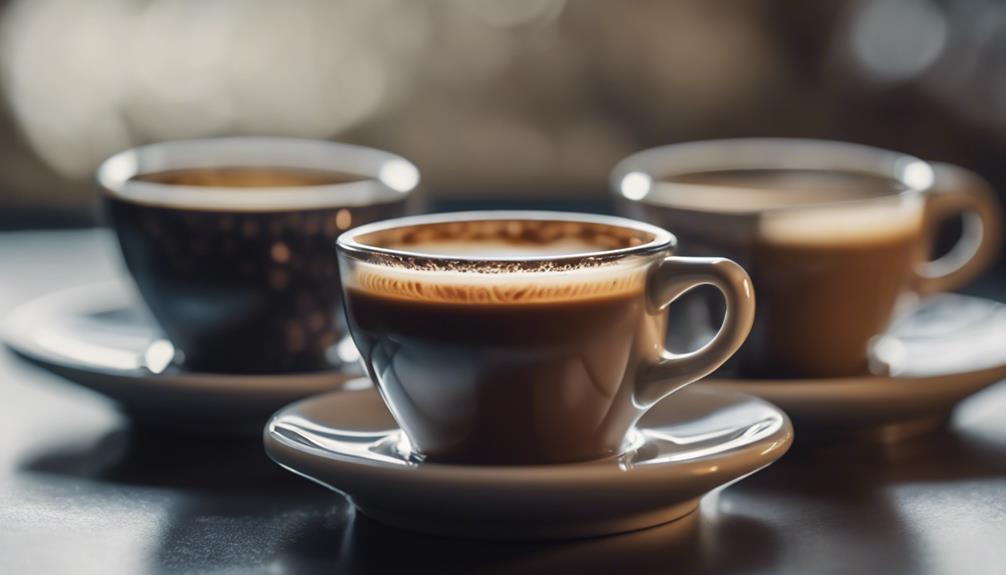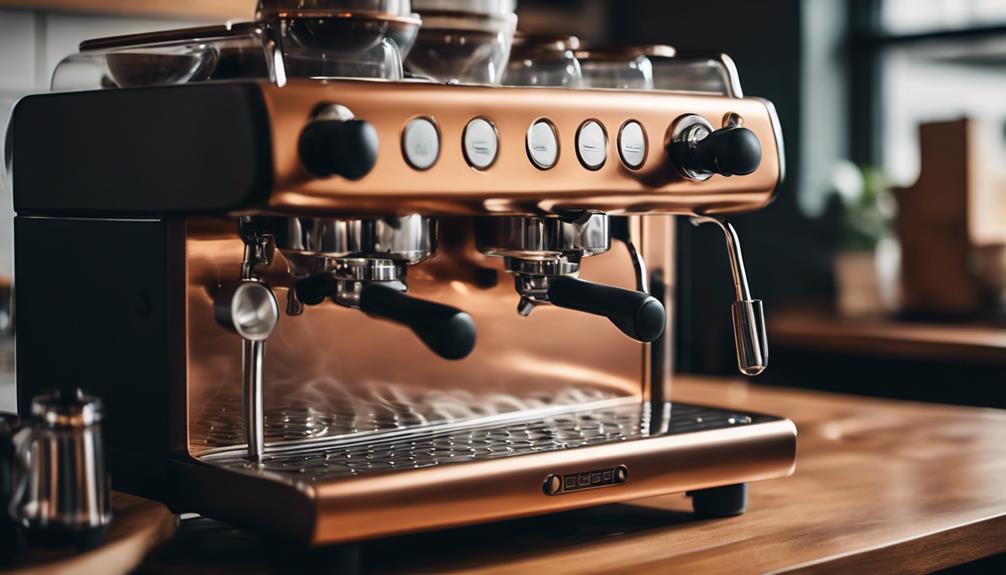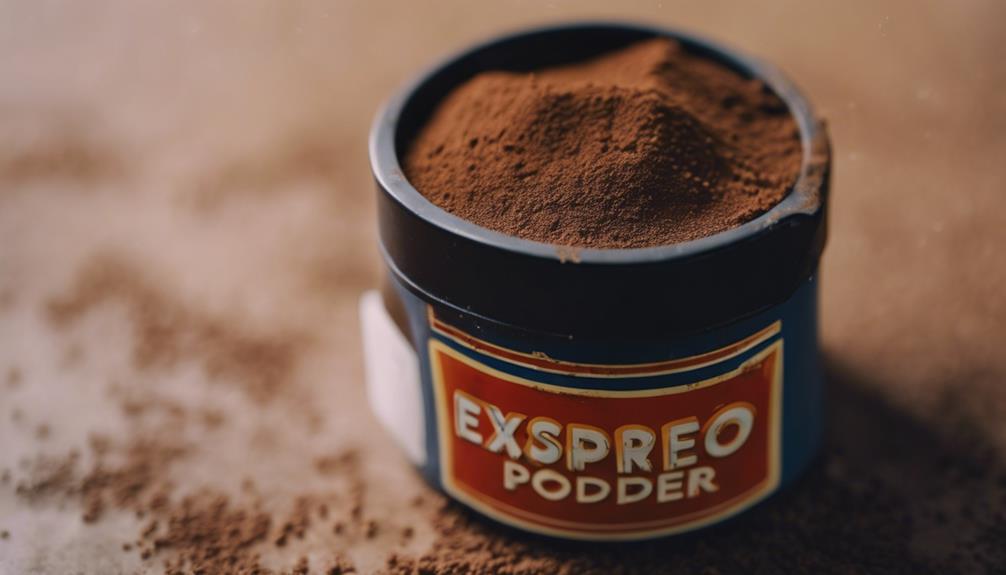When enjoying your espresso, target an espresso cup weighing 160-170g for a premium coffee experience. The weight of the cup impacts temperature, crema, and overall satisfaction. Heavier cups such as La Marzocco varieties help retain heat and enhance crema. Various factors like materials, design, and thickness influence cup weight, improving grip stability and comfort during sipping. Opting for cups within this weight range ensures a well-balanced feel and enhanced coffee enjoyment. Notice the difference in your espresso routine with cups in this ideal weight range. Learning more about espresso cup weight can elevate your coffee moments.
Key Takeaways
- Ideal espresso cup weight: 160-170g for optimal heat retention.
- Thicker cups like La Marzocco cups enhance crema and warmth.
- Cup weight impacts espresso temperature and drinking experience.
- Material, design, and thickness influence cup heaviness.
- Balancing stability and comfort, choose cups within 160-170g range.
Importance of Espresso Cup Weight
Understanding the importance of espresso cup weight is essential for enhancing your espresso drinking experience. The ideal weight for an espresso cup typically falls around 160-170g, ensuring a balanced feel in your hand while sipping your favorite brew.
Thicker cups, such as the renowned La Marzocco cups, are favored for their ability to retain heat and enhance crema, the golden layer atop your espresso. The cup weight plays a significant role in maintaining the temperature of your espresso, as thicker cups act as heat sinks, impacting the overall temperature of your drink.
It's important to use preheated, thick cups to keep your espresso at the perfect temperature and to preserve its rich crema. By understanding the significance of espresso cup weight, you can elevate your coffee experience by ensuring that your espresso stays hot and flavorful until the last sip.
Factors Affecting Cup Heaviness

Factors influencing the heaviness of an espresso cup include the materials used, design features, and manufacturing processes.
The cup material and thickness greatly impact the cup weight, affecting heat retention and the overall drinking experience. Thicker cups, such as La Marzocco cups, are designed not only to be heavier but also to retain heat better than thinner alternatives. This feature enhances the temperature maintenance of the espresso, contributing to a quality enhancement in the drinking experience.
The weight of an espresso cup plays an important role in providing a balanced feel when held in hand, allowing for a comfortable and stable grip while savoring the coffee.
Ideal Weight Range for Espresso Cups

When selecting espresso cups, considering the ideal weight range of around 160-170g is key to enhancing your coffee-drinking experience. Espresso cup weight is important as it affects heat retention, crema maintenance, and overall espresso temperature. Thicker cups, such as the ones from La Marzocco, are known to retain heat better than thinner alternatives, providing a more enjoyable drinking experience.
To better understand the importance of cup weight, let's take a look at the following table:
| Cup Brand | Weight (g) | Thickness | Heat Retention |
|---|---|---|---|
| La Marzocco | 165 | Thicker | Excellent |
| illy by IPA | 170 | Increased | Improved |
| Thin Cups | 150 | Thin | Average |
| Custom Ceramic | 160 | Medium | Good |
Choosing cups within the 160-170g range, like the ones from illy by IPA, can have a significant impact on your espresso experience by maintaining the temperature and crema quality effectively.
Balancing Stability and Comfort

To achieve a perfect balance between stability and comfort when selecting an espresso cup, consider the ideal weight range of 160-170g.
Thicker cups, such as the ones produced by La Marzocco, are favored for their ability to retain heat, enhancing the overall espresso-drinking experience. The increased thickness of these cups acts as heat sinks, impacting the temperature of the espresso being served. Thicker cups not only aid in heat retention but also contribute to maintaining the crema and the ideal temperature of the espresso, thereby influencing the quality of the drink.
Recent developments in cup design, like the newer illy cups, have shown a trend towards increased weight and thickness to improve the overall quality of the espresso. By selecting cups within the recommended weight range, you can secure a stable grip while also enjoying a comfortable drinking experience, all the while appreciating the influence that cup thickness has on crema maintenance and espresso temperature.
Impact of Cup Material on Weight

Consider how the weight of an espresso cup can be influenced by the material it is made from, impacting your overall espresso-drinking experience. The choice between porcelain, ceramic, double-walled glass, or stainless steel cups can notably affect the cup's weight, heat retention capabilities, and durability. Here is a comparison of the average weights for each type of material:
| Cup Material | Average Weight (g) | Impact on Espresso Experience |
|---|---|---|
| Porcelain | 160-170 | Balanced weight for a comfortable experience |
| Ceramic | 140-150 | Lighter alternative with good heat retention |
| Double-walled glass | 100-120 | Lightweight and still maintains heat well |
| Stainless steel | 150-180 | Durable and modern option for espresso lovers |
Your preference for the weight of the espresso cup can vary based on what feels comfortable to hold and drink from. Additionally, the material choice can affect how well the cup retains heat and its overall longevity. Selecting the right weight that aligns with your preferences can enhance your espresso-drinking ritual.
Choosing the Right Weight for You

Finding the ideal weight for your espresso cup can greatly enhance your coffee-drinking experience. A weight between 160-170g is often considered best, providing a balanced feel in your hand while aiding in heat retention for your precious brew.
Thicker cups, such as the La Marzocco cups, are favored for their ability to keep your espresso at the perfect temperature, enhancing your overall enjoyment. The thickness of the cup plays a vital role in maintaining the crema on top of your espresso and making sure that the temperature of your drink stays just right.
Recent cup collections, like the illy Pen Tests, have an average weight of about 142g, catering to those seeking a slightly lighter option for their espresso indulgence. When selecting your espresso cup, consider the weight carefully to make sure it aligns with your preferences and enhances your coffee ritual to the fullest.
Frequently Asked Questions
How Heavy Do Espresso Cups Have to Be?
Espresso cups should ideally weigh around 160-170g for peak heat retention and enjoyment. Thicker cups, like La Marzocco's, are known for superior heat preservation.
Recent illy cups from IPA have increased weight and thickness, highlighting the importance of thickness.
Cup weights vary; Pen Tests 2004 collection averages 142g per cup, while Rosenthal's Haim set cups in 2003 weigh around 120g.
Competitively, emphasizing increased weight and thickness is essential to match rivals.
What Is the Perfect Weight for Espresso?
The perfect weight for an espresso cup is typically around 160-170g to guarantee ideal heat retention and a satisfying drinking experience.
Thicker cups, such as those from La Marzocco, are preferred as they excel in preserving heat compared to thinner options. When adequately preheated, these cups help maintain the crema and temperature of your espresso, enhancing your overall enjoyment.
Cup weight has a notable impact on the quality and taste of your espresso, with thicker cups being favored for their superior heat retention qualities.
What Kind of Cup Is Best for Espresso?
For the best espresso experience, a cup that retains heat like a cozy blanket is ideal. Thicker cups, such as La Marzocco cups, excel in heat retention, enhancing the espresso's quality.
Thinner cups may cool down the espresso quicker due to acting as heat sinks. The thickness of the cup greatly impacts the crema and temperature of the espresso.
Recent cup collections emphasize increased weight and thickness to elevate the overall espresso drinking experience.
How Many Grams Should a Double Espresso Be?
A double espresso typically weighs around 160-170 grams, ensuring peak flavor and temperature retention.
This weight range is perfect for a satisfying espresso experience. It helps maintain the coffee's heat and flavor profile, enhancing your enjoyment.
Is the Weight of an Espresso Cup Related to its Size in Milliliters?
When it comes to understanding big espresso cup sizes, the weight and size in milliliters are not always directly related. While larger cups will generally weigh more due to the extra material, the actual weight can vary based on the materials used, thickness, and design of the cup.
Is the Weight of an Espresso Cup Important for Making Strong Coffee?
The weight of an espresso cup is not crucial for making Turkish coffee stronger espresso. The strength of the coffee depends on the amount of coffee grounds and water used. The brewing method and grind size also play a significant role in achieving a strong cup of coffee.
Conclusion
To sum up, when considering the weight of an espresso cup, balance is key. Opt for a cup that falls within the ideal weight range for stability and comfort.
Remember that the material of the cup can also impact its weight. Choose a cup that feels right for you, ensuring an enjoyable espresso experience every time.
So, sip your espresso from a cup that's just right for you – a perfect pairing for your daily dose of caffeine!









